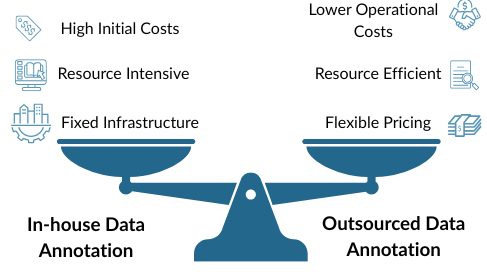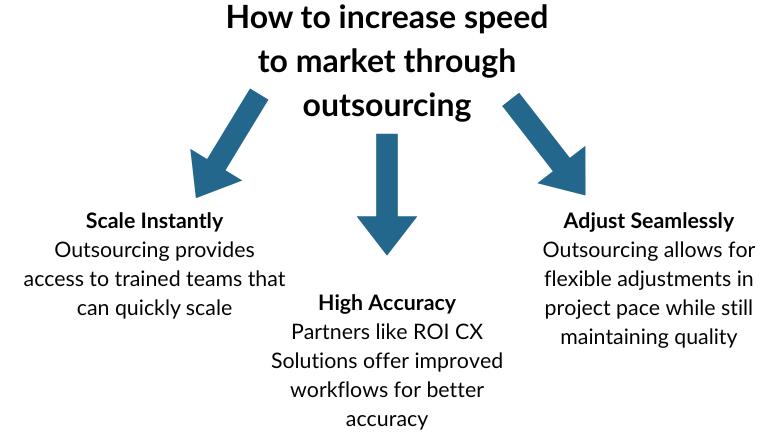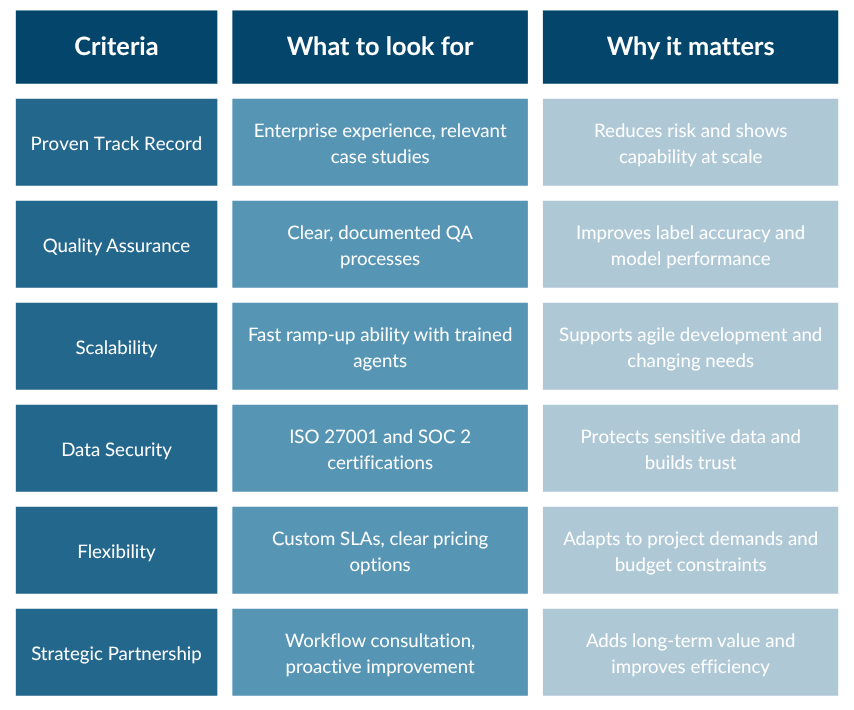The Business Case for Outsourcing Data Annotation: Cost, Quality, and Speed Compared
Outsourcing data annotation to a BPO saves time, reduces costs, and ensures higher accuracy compared to building an in-house team. BPO providers have the tools, expertise, and scalable workforce needed to handle large volumes of data quickly and consistently, allowing enterprises to focus on core business and accelerate AI initiatives without the burden of managing annotation internally.
Read Time: 8 minutes
Table of Contents
- Why Data Annotation is a Growing Enterprise Challenge
- Partner With ROI CX Solutions For AI Data Annotation
- Cost Comparison: In-House vs. Outsourced Data Annotation
- Quality Comparison: In-House vs. Outsourced Teams
- Speed and Scalability: Meeting Enterprise AI Demands
- How to Choose the Right Data Annotation Partner
- The Competitive Edge of Outsourcing Data Annotation
Introduction
There is a rapid digital transformation fueled by artificial intelligence happening in the healthcare, retail, logistics, and finance industries. The need for accurate and scalable data annotation is quickly becoming a critical function.
Data labeling is complex, consumes a lot of resources, and is hard to scale internally. Building internal annotation teams can become a roadblock to many enterprises’ AI goals, which is why data annotation outsourcing is becoming a popular solution.
This article breaks down the business case for outsourcing data annotation, with a direct comparison of cost, quality, and speed between in-house teams and third-party data annotation companies.

Why Data Annotation is a Growing Enterprise Challenge
At its core, data annotation is the process of labeling raw data such as text, images, or audio, so machines can learn from it. These labeled datasets are what train artificial intelligence, automations, and other machine learning initiatives.
Enterprises are generating more data than ever before that hold AI-driven insights. Without the annotation, it's just noise. This data must first be labeled before it can turn into fuel for AI, and that is where the challenge begins.
This annotation process is often underestimated by enterprises in terms of scope, difficulty, and resources required for it. While AI initiatives scale quickly, the support functions behind them, like data labeling services, must also grow to meet demand. More often than not, internal teams lack the tools, manpower, and expertise to keep up.
The Operational Strain of In-House Annotation
If you are hosting your data annotation in-house, you might notice that it pulls time and focus away from your core business. With enterprises that build the annotation team from scratch, the learning curve is often steep.
Investing in software, hiring the right people, training, and quality control are just a few things that add to the strain. Not to mention the operational challenges that come from turnover, fluctuating project requirements, and the pressure to maintain accuracy under tight deadlines.
You're going to find that it places a significant burden on not only HR but the entire technical team as well. These pain points make it difficult to sustain a reliable, in-house data annotation service.
Poor Annotation = Poor AI Outcomes
Another reason why data annotation is a growing enterprise challenge is because of data labeling mistakes. Poorly labeled data leads to your models making poor decisions, regardless of how sophisticated the algorithm is.
Let's take a look at a few simple examples:
- A retail AI model trained on mislabeled product images might recommend the wrong items to shoppers.
- In healthcare, if tumor images are labeled inconsistently, diagnostic models could miss early signs of disease.
- In logistics, a mislabeled dataset for object detection might cause autonomous vehicles to misinterpret road sights or obstacles.
The cost of data annotation errors grows exponentially the further they travel down the pipeline.
Data annotation also carries a significant financial cost, making it essential to examine the economics of in-house versus outsourced data annotation.
Cost Comparison: In-House vs. Outsourced Data Annotation
Enterprises are constantly under increasing pressure to do more with less. Investing in AI and maintaining operational efficiency is critical; we all know that. But how do you do that when maintaining data annotation services is so costly?
By comparison, outsourcing data annotation provides businesses with experts in the field without any of the overhead costs. Sounds nice, right? In fact, on average, companies that outsource their annotation lower costs by about 60%.
True Costs of In-House Data Annotation
The cost of in-house data annotation goes beyond salaries. The hiring and onboarding process alone is complex and expensive. When you factor in benefits, facilities, and the software needed, it all adds up and becomes too much. Not to mention the ongoing expense of quality control, turnover, management, and rework due to errors. The money spent on all of this could be put to better use. Organizations could invest more in core company functions.
Another thing that flies under the radar with in-house data annotation is the indirect costs. For example, lost opportunities caused by delays in AI-deployments. Relying solely on in-house annotation often puts enterprises at a competitive disadvantage, as they tend to struggle to keep pace with faster, more agile organizations that use outsourced support.
How Outsourcing Reduces Costs
Data annotation outsourcing significantly lowers costs. BPO partners already have smooth workflows, specialized tools, and trained personnel. Businesses don't have to be concerned about lengthy hiring cycles, facilities, or even benefits.
Instead, they can quickly bring in external data labeling services and only pay for the work that's done. Both short-term and long-term savings are produced by the flexible pricing structure and the lessened load that comes from not having to provide infrastructure.
On top of reducing operational costs, outsourcing also reduces financial risk. You can easily scale up or down as necessary, and you are not restricted by paying full-time salaries or dealing with long-term contracts. Additionally, partners with global talent pools are able to provide competitive pricing without sacrificing quality.
Outsourcing data annotation dramatically reduces upfront investments. So, your company will be able to reinvest in innovation, analytics, and strategic initiatives. Which also means you don't have to worry about providing benefits, hiring cycles, or even facilities.
Cost savings are only part of the story though, because outsourcing also delivers measurable improvements in quality that directly impact AI performance.
Quality Comparison: In-House vs. Outsourced Teams
The success of AI is directly impacted by the quality of data annotations. Despite their proximity to the company, in-house teams frequently lack the depth of knowledge and quality assurance systems needed to manage high-volume, high-stakes annotation work. Below, we've compared internal and outsourced quality to help provide a better picture.
Common In-House Quality Pitfalls
There is a higher risk of inconsistency when data annotation is handled internally. New annotators sometimes are not properly trained, and quality control is more reactive than proactive. Internal teams begin to struggle as projects grow in complexity and errors made may be more costly than you might think.
Data annotation is not a natural skill set of the core team, with staff taking over with minimal training and not a lot of feedback quality naturally suffers. These problems slow everything down and make it harder for people to trust your systems. However, with the right outsourced help, these issues are totally preventable.
How Professional BPOs Deliver Higher Quality
Professional data annotation companies bring industry-tested workflows, robust quality assurance, and highly trained teams. They've refined their processes so well the number of errors is reduced, and teams provide more consistency.
- They also bring to the table:
- Multi-layered review systems
- Specialized tools
- Domain-specific knowledge
Most in-house teams simply can't match the amount of specialized training they bring to the table. Outsourcing data annotation can bring cleaner datasets, faster training, and even better AI outcomes.
That level of precision and consistency is hard to achieve internally, which is why more and more enterprises are turning to trusted outsourcing partners.
Speed and Scalability: Meeting Enterprise AI Demands
AI development cycles depend on constant streams of labeled data and often, in-house teams have a hard time keeping up. Scaling becomes another challenge because it requires so much time invested in hiring, training, and managing staff.
Outsourced data annotation changes that. These external teams are already trained and ready to scale with you. You can ramp up fast, meet shift demands, and keep AI projects moving forward almost effortlessly.
This flexibility means you can tackle your next big opportunity with confidence.
Scaling In-House Teams Is Slow and Costly
Building a good internal team takes time and money. On average, a new hire costs about $4,129 and that is before you factor in salaries, benefits, and turnover. This becomes a major hurdle when project volumes spike or due dates shift unexpectedly.
Internal teams may also lack the flexibility to shift gears when priorities change. When a project needs to ramp up fast or head in a new direction, it is absolutely chaos. Enterprises that switch to outsourcing spend less while being able to get the support they need.
How Outsourcing Increases Speed to Market
Data annotation outsourcing gives enterprises access to trained teams that can scale instantly. Need to annotate 100,000 images this week? Easy! Need to slow things down next month? No problem.
You can shorten AI development cycles when you outsource because you become more flexible. This ability to seamlessly adjust will help you tackle new opportunities head on without having to worry about the competition.
Partners like ROI CX Solutions specialize in high velocity, high accuracy annotation workflows to give you speed without sacrificing quality. The incredible team at ROI CX Solutions can help you hit ambitious milestones faster than internal teams ever could.

How to Choose the Right Data Annotation Partner
Selecting the right BPO partner for data labeling services is all about knowing what to look for. You want a partner that is going to feel almost like an extension of your team that helps you move faster, smarter, and more securely.
To help you make the right call, here are the key things to look for when a data annotation partner.
Key Evaluation Criteria
The best data annotation partners bring experience and understand the unique demands of enterprise work. High-quality partners maintain structured quality assurance processes that ensure accuracy and consistency from the start. They can scale quickly and support ever evolving needs of the enterprise.
Data security is a foundational requirement. Leading providers follow strict protocols aligned with standards like the SOC 2 or the ISO 27001. These ensure the company is safeguarding your information every step of the way.
Flexibility is another key trait of a top partner. More than just a vendor, they act as a true collaborator that is doing proactive work to keep you on top.
For a quick overview, the graphic below breaks down all the things you need to look for in more detail.

With all these things in mind, you should be able to choose the right outsourcing partner for you.
The Competitive Edge of Outsourcing Data Annotation
In a race to build smarter AI, enterprises can’t afford to be held back by the burdens of manual data labeling. With outsourced data annotation, companies get lower costs, higher quality, and faster execution.
The right partner makes data annotation services streamlined, scalable, and a secure asset for your AI roadmap.
Talk to a Data Annotation Expert at ROI CX Solutions today and discover how outsourcing can help your business grow.






